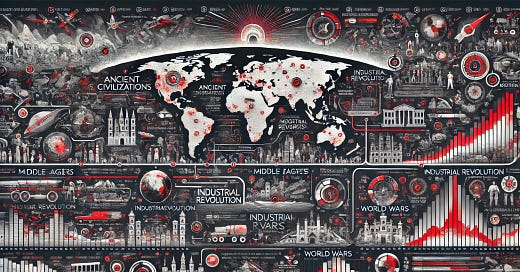Today’s featured Substack is Byte-Sized History by J. Michael Wahlen.
Perhaps the most important type of history people need to have a better sense of today is economic history, ideally tied to the evolution of technology. Byte-Sized History satisfies this need with wide-ranging case studies on the big backstories that matter. Insightful storytelling combines with clarity, detail, and data. I find myself pondering, posing questions, and often responding to Michael’s posts in various ways.
Here are a few favorites to get started. Subscription recommended!
If you could list four main reasons why learning history is valuable, what would they be? Make your list then compare.
Or, what about the “little black dress” of data science and the entire history of the world?
As elegant as Chanel’s little black dress, [The World’s Greatest Graph] has only one dataset, uses a linear scale, and has only one color pattern. But, through the use of a single line, it tells us the entire journey of the world.
In struggling to gather my thoughts about Brad deLong’s economic history of the 20th century, Slouching Toward Utopia, I ran across Michael’s review.
Finally, we know how crucial the China-Taiwan relationship is, but do you know the backstory of the development of Taiwanese semiconductor chips? Here’s the teaser:
Taiwan is a modern marvel. A small island off the coast of China with a population slightly larger than Florida, Taiwan accounts for nearly a quarter of the world’s semiconductors. But, when it comes to the most innovative chips, Taiwan’s lead is even greater: of the most advanced semiconductors, those less than 10 nanometers thick, Taiwan produces a whopping 92% of global output. In management-consultant speak, Taiwan has a market share in the most advanced semiconductors slightly greater than Google’s market share of web searches.
And there is much more. Go learn, and enjoy.






Thanks, Tracy. I subscribed . And I agree with you, economic history and the history of technology are very important in helping us understand the present. It's unfortunate that (IMO) a lot of these histories treat the present as inevitable. For example, Vaclav Smil's approach to tech -- which may explain why he was such a favorite author of Bill Gates.